新人教版高中英语选修7 Unit5 Travelling Abroad Workbook 听力及文稿
人教版高中英语选修七Unit5travellingabroad课文知识点
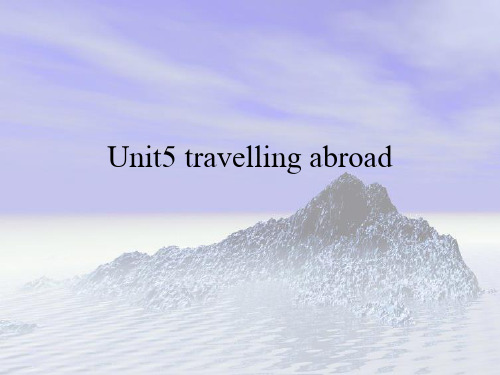
5.He wanted to know what I thought, which confused me because I thought that the author of the article knew far more than I did.(L26)
it d do sth. 是时候做...
1.It was the first time she had ever left her motherland.(L3) 译:这是她第一次离开自己的祖国。 1.Jack is a great talker. It's high time that he______ (do) something instead of just talking. 2.It was the first time that I have XXXg an English song before so many people. 3. It is high time that we go to bed.
Unit5 travelling abroad
Paras1-3
boarded a plane
登上飞机
dreamed of this day
梦想这天
know what to expect
知道期待什么
waiting in a queue
排队等待
for a business qualification 为了一个商务资格
译:还有,当我想家时,房东家就像是我另外的 家人,和他们在一起给了我莫大的安慰。
Your worse behivour makes all of us feel
_di_s_co_m__fo_r_ta_b_l_e_(comfort), so you should care for it.
人教版高中英语选修7 Unit5 Travelling abroad

Skimming
What is the main idea of the article?
Give one sentence to describe it. (30words)
It mainly talks about the Chinese university ______ study student Xie Lei’s __________ and ______, life ____ especially about some _______ benefits she gets as well as some _______ she faces while studying in difficulties London.
3)Why did she feel like a child when she first arrived in England? Because she had to learn how to do everyday things like using a telephone, paying on a bus, finding her way around a strange city; understanding English as spoken in real life; learning how to write essays acceptable to her British lecturer.
Unit 5 Travelling abroad
Warming up and Reading I
教学设计
教材分析 学情分析 教法学法
教学过程
板书设计
教学反思
Teaching objectives 1.Language aims By the end of the class,the students will be able to: Read,write and use the words and expressions freely and correctly. 2. Ability aims
高考英语:选修7+Unit+5 Travelling+abroad+Word版含答案
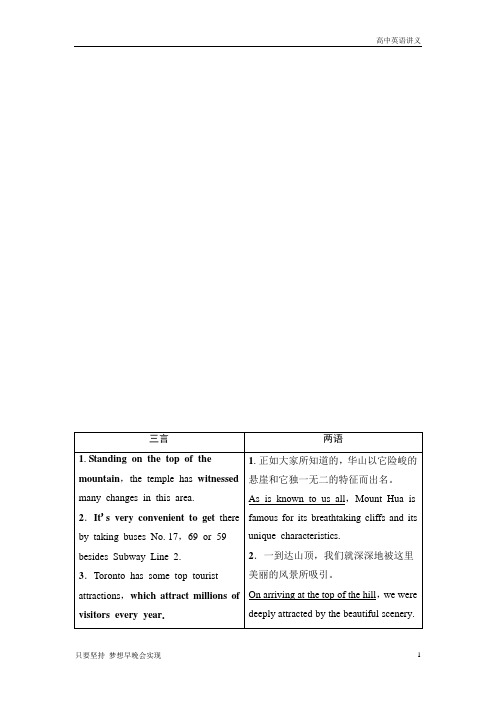
[单词拼写应用]1.(湖南卷)I didn't want to lecture,but I wanted other diabetics to know that things get better when we're selfcontrolled and do our part in managing the disease.说教2.When he walked into the meetingroom for his first visit, he acknowledged the group, removed his jacket and neatly folded it across the back of the chair.对……打招呼[短语多维应用]1.recommend vt.推荐;建议;介绍;劝告recommend sth.to sb./ recommend sb.sth.向某人推荐/介绍某物recommend doing sth.建议做某事recommend that...(should) do sth.建议做某事It is/was recommended that...(should) do...有人建议……a letter of recommendation推荐信follow mother's recommendations听从母亲的劝告[基础练习]——单句语法填空①(2019·全国卷Ⅲ)Our hosts shared many of their experiences and recommended (recommend) wonderful places to eat, shop, and visit.②(2017·北京卷)A great many tourist spots can be found along the Yangtze River, and that's why I recommend the trip to you.③a.I recommend making(make) seat reservations in advance, because this is a popular film and there will be a lot of audience.b.(福建卷)Teachers recommend parents(should) not allow(not allow) their children under12to ride bicycles to school for safety.[链接写作]——一句多译规定里面要求的是你们不能将邮箱密码告诉别人。
人教版高中英语选修7高考复习选修7Unit5Travelling abroad新人教版课件ppt
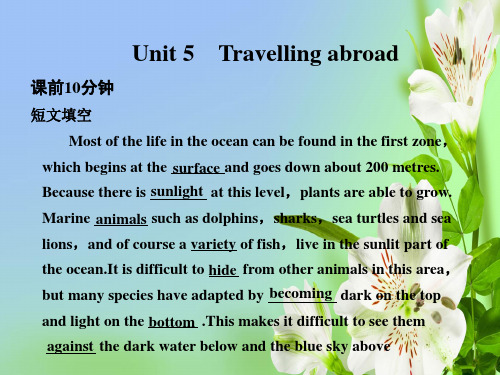
Ⅱ.短语填空 adjust to;keep it up;as far as one is concerned;feel at home;be popular with;fit in;be occupied with;out of the question;ears quite normal.
A.stays B.gets C.feels D.looks
4.I have been so occupied C used to everything that I haven’t
had time for social activities. A.to get B.to getting C.getting D.on getting
D.adjustments
3.I can’t go out—I’ve got to do some C for my exams taking
place next week.
A.routine B.lecture C.revision D.assistance
4.By 1914 the government was forced to D that its policy
提示recommend后可接that从句,从句中谓语动词用should+v.
形式,should可省略。 I recommend that he see a lawyer.我建议他去找个律师。 It is strongly recommended that the machines should be checked every year. 建议每年把机器检修一次。
高考英语 Unit5《Travelling abroad》知识与要点课件 新人教选修7
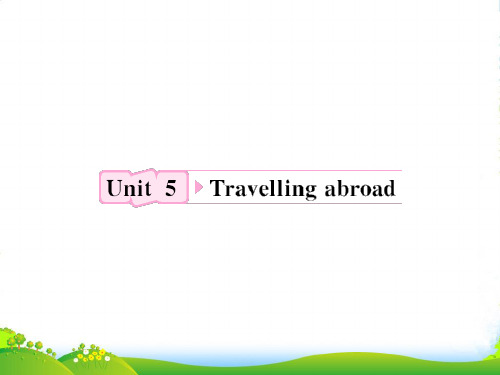
vt.用……代替/
(1)substitute for sb./sth.代替/取代某人/物
substitute substitute
B A
with A用 for B
A
代替
B
(2)as a substitute 作为代替人/代用品
a substitute for...……的代替者(代用品)
be no substitute for 没有……那样好;不如……称心
虚拟语气,谓语动词用(should)do形式。
【答案】 A
②I can ________ him to you for the job.He is a very good
worker.
A.suggest
B.recommend
C.advise
D.prompt
【解析】 句意为:我可以把他推荐给你做这份工作,
“向……表示感谢”。admit 意为“承认”;attribute 意为
“把……归因于”;accept 意为“接受”。
【答案】 B
②Only after he was brought to the police station did the
young man ________ he had stolen some purses from other
重点 短语
adjust to,keep it up,fit in,get used to,as far as one is concerned,be occupied with,day in and day out,feel at home,out of the question,settle in
同类辨析 replace与substitute
高中英语选修7 Unit5 Travelling Abroad教案
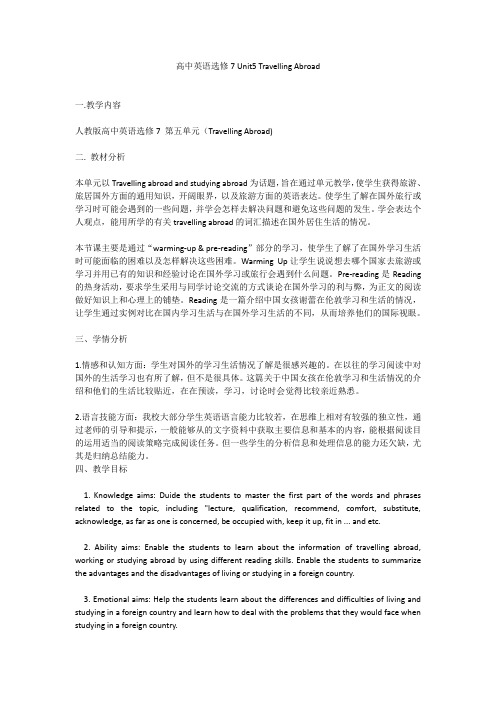
高中英语选修7 Unit5 Travelling Abroad一.教学内容人教版高中英语选修7 第五单元(Travelling Abroad)二. 教材分析本单元以Travelling abroad and studying abroad为话题,旨在通过单元教学,使学生获得旅游、旅居国外方面的通用知识,开阔眼界,以及旅游方面的英语表达。
使学生了解在国外旅行或学习时可能会遇到的一些问题,并学会怎样去解决问题和避免这些问题的发生。
学会表达个人观点,能用所学的有关travelling abroad的词汇描述在国外居住生活的情况。
本节课主要是通过“warming-up & pre-reading”部分的学习,使学生了解了在国外学习生活时可能面临的困难以及怎样解决这些困难。
Warming Up让学生说说想去哪个国家去旅游或学习并用已有的知识和经验讨论在国外学习或旅行会遇到什么问题。
Pre-reading是Reading 的热身活动,要求学生采用与同学讨论交流的方式谈论在国外学习的利与弊,为正文的阅读做好知识上和心理上的铺垫。
Reading是一篇介绍中国女孩谢蕾在伦敦学习和生活的情况,让学生通过实例对比在国内学习生活与在国外学习生活的不同,从而培养他们的国际视眼。
三、学情分析1.情感和认知方面:学生对国外的学习生活情况了解是很感兴趣的。
在以往的学习阅读中对国外的生活学习也有所了解,但不是很具体。
这篇关于中国女孩在伦敦学习和生活情况的介绍和他们的生活比较贴近,在在预读,学习,讨论时会觉得比较亲近熟悉。
2.语言技能方面:我校大部分学生英语语言能力比较若,在思维上相对有较强的独立性,通过老师的引导和提示,一般能够从的文字资料中获取主要信息和基本的内容,能根据阅读目的运用适当的阅读策略完成阅读任务。
但一些学生的分析信息和处理信息的能力还欠缺,尤其是归纳总结能力。
四、教学目标1. Knowledge aims: Duide the students to master the first part of the words and phrases related to the topic, including "lecture, qualification, recommend, comfort, substitute, acknowledge, as far as one is concerned, be occupied with, keep it up, fit in ... and etc.2. Ability aims: Enable the students to learn about the information of travelling abroad, working or studying abroad by using different reading skills. Enable the students to summarize the advantages and the disadvantages of living or studying in a foreign country.3. Emotional aims: Help the students learn about the differences and difficulties of living and studying in a foreign country and learn how to deal with the problems that they would face when studying in a foreign country.五、教学重点及难点1. Widen the vocabulary range. Develop the students’reading skills namely skimming and scanning and so on.2. Guide the students to summarize the benefits and difficulties of living in a foreign country.六. 教学方法1.演示法:通过相关的图片、PPT等网络多媒体辅助显示给学生看,便于学生对基础知识和背景知识的把握,并从旧知识中获得启迪,从而达到解决问题的目的。
人教版高中英语选修7 Unit 5 Travelling abroad Section Ⅰ
B.the tutor thought the essay was not well written
C.the essay was a summary of an article
D.Xie Lei didn’t know how to write an essay
答案C
随堂练习
一二三四
晨读晚诵
自主预习
China and 1. boarded (board)a plane for London.
When she was there,she had to adjust 2. to
the new
environment.Now she is halfway through her 3. preparation
合作学习
随堂练习
5.According to the text,two types of people helped Xie Lei.They
were
.
A.a host family and a tutor
B.a host family and her classmates
C.her classmates and a tutor
实际上我们旅行不仅仅是为参观旅游景点,也是为了从旅行经历 中学到各种知识,而这些知识将帮助我们形成关于世界的正确概念 和观点。
晨读晚诵
自主预习
合作学习
随堂练习பைடு நூலகம்
理解诱思 1.What can we learn from the text? A.Knowledge comes from travelling. B.Travelling abroad can help us know the world. C.Do in Rome as the Romans do. D.What can broaden our view matters. 答案:B 2.Which country would you go to if you had a chance to go travelling abroad?Why? 答案:略
人教版高中英语选修七Unit 5 Travelling abroad
高中英语学习材料(灿若寒星*制作整理)Unit 5 Travelling abroad第二部分:阅读理解(共两节,满分40分)第一节(共15小题;每小题2分,满分30分)阅读下列短文,从每题所给的四个选项(A、B、C和D)中,选出最佳选项。
A★★☆☆☆Michelle was a student at University of California, Los Angeles. She is here to tell us how she feels about the city.What were the best things about Los Angeles?One of my favorite things about Los Angeles is the weather. I hate the cold and it never really gets that cold there. Plus, most of the time it’s usually sunny, which is good because I love going to the beach during the summer. There’s so much to do at the beach, but my favorite thing in L.A. was having a picnic on the sand with my friends.What were the worst things about being there?I disliked having to drive everywhere to get around because the city is so spread out. Los Angeles has a lot of traffic and sometimes it takes a long time to get somewhere close by just because the streets are so crowded. Also, a lot of people complain about the pollution.Did you have any problems there?Just the normal problems of living in any city, like watching out for pickpockets (扒手). Some people think Los Angeles has a lot of crime, but I think it’s as safe as any other city. Also, many people think driving is difficult because there is a lot of traffic and road rage (路怒症), but it just takes a little practice and a lot of patience.What are the people like in Los Angeles?There are all types of people in Los Angeles since the city is pretty diverse. For the most part, though, most of the people are friendly, calm and relaxed. Some people say that everyone in Los Angeles is beautiful, but I think that’s just a stereotype (模式化的印象).Would you go back to Los Angeles?Certainly. Los Angeles is one of my favorite cities in the world. I love the fact that it has all the nightlife and shopping of a big city, but also has access to beaches, parks, mountains and other places you can’t usually find in large cities. Between the weather and the beaches and all the fun things to do, it’s a great plac e to be.21. We can learn from the text that Michelle _____.A. hates the heavy traffic in Los AngelesB. dislikes the cold weather in Los AngelesC. thinks Los Angeles is small and crowdedD. enjoys driving everywhere in Los Angeles22. What’s Michelle’s impression of the people in Los Angeles?A. They get angry easily.B. All sorts of people live there.C. They are patient and amusing.D. Everyone is kind and beautiful.23. How does Michelle find Los Angeles?A. Safe but noisy.B. Relaxing but busy.C. Polluted and dangerous.D. Diverse and interesting.24. We learn from the text that _____.A. Michelle was born in Los AngelesB. Michelle loved the life in Los AngelesC. Los Angeles has many traffic accidentsD. Michelle has no plan to return to Los AngelesB★★★☆☆Evergreen Teen Book Club OfferThe Evergreen Teen Book Club invites you to join us and take full advantage of our limited-time introductory offer.If you join our club, you will receive a certificate for 3 free books. These are yours to keep, even if you decide to cancel your membership. However, if you decide to purchase just one book at the regular club price, you will receive a certificate for an additional 3 free selections after your first order is placed.As our member, you can benefit from all of our super sales and our Bonus Program. You accumulate (积累) 2 bonus points with each cash purchase of one book. Every 6 bonus points will earn you a certificate for one free book!To join our club, fill in the brief application listing your name, address, and phone number on the postage-paid card at the bottom of this page. Then drop the card in the mail and our present catalog will be immediately mailed out to you for your 3 free selections!This catalog offers a wide selection of over 500 books in every issue, including mysteries, adventures, biographies, cookbooks, sports, and many more. Our catalog also contains interviews with your favorite authors, reviews of newly published novels, and a teen top-ten list for both fiction and nonfiction.Once you are a member, you will receive our catalog monthly, but you don’t need to purchase any selections. We send you only exactly what you order.If you join before June 30th, we will also provide complimentary shipping (免费送货), even if you choose to order nothing except your 3 free books.You can build a great book collection!Begin now by taking advantage of this great offer.25. If you join the Evergreen Teen Book Club, you can _____.A. buy books at cost priceB. receive a gift after each orderC. expect 3 free books each monthD. get one free book for a cash purchase of 3 books26. If Lily wants to get free delivery, she should _____.A. join the club before June 30thB. accumulate 6 bonus pointsC. order at least 3 booksD. purchase the catalog27. The purpose of the text is to get more people to _____.A. collect books for the clubB. learn from famous writersC. read different kinds of booksD. join the club and order booksC★★★★☆Darek Fidyka, a 38-year-old Bulgarian, had been paralysed (瘫痪的) from the chest down for four years after a knife attack. Scientists from Britain and Poland took cells from his nose, transplanted (移植) them into his back and re-grew his spinal cord (脊髓). Now he can walk and even drive a car. The doctors were delighted but said it was the first step in a long journey.The breakthrough came after 40 years of research by Professor Geoff Raisman, who found that cells had the possibility to repair damage to nasal (鼻腔的) nerves, the only part of the nervous system that constantly re-grows. “The idea was to take something from an area where the nervous system can repair itself, and does sothro ughout life, and put it into an area that doesn’t repair itself,” Professor Raisman said.Polish doctors injected the nasal cells into Mr Fidyka’s spinal cord above and below the injury and used some nerves from his ankle to form a bridge across the damaged tissue. The nasal cells appear to have caused the spinal nerves to repair themselves.Professor Raisman achieved this with rats in the late 1990s, but this is his greatest success. “I think the moment of discovery for me was Christmas in 1997 when I first saw a rat that couldn’t control its hand put its hand out to me. That was an exciting moment, because I realised then that my belief that the nervous system could be repaired was true.”Doctors chose the easiest case for their first attempt — it might not work for others. But there is a real sense of hope that an idea once thought impossible has been realised.David Nicholls, who helped provide money for the breakthrough, said information about the breakthrough would be made available to researchers across the globe.“What you’ve got to understand is that for three million paralysed people in the world today, the world looks a totally brighter place than it did yesterday,” he said.28. Why did Professor Geoff Raisman choose cells from the nose?A. The nervous system in the nose can repair itself.B. Cells in the nose can be easily transplanted.C. Cells in the nose re-produce rapidly.D. He just wanted to give it a try.29. Why did the operation work for Darek Fidyka?A. The nasal cells re-produced and spread quickly.B. The nerves from his ankle helped cure the injury.C. The nervous system in the spinal cord can repair itself.D. The nasal cells helped the spinal nerves to repair themselves.30. What made Professor Geoff Raisman believe the nervous system can be repaired?A. His study on animals.B. His operation on a paralysed patient.C. His sudden thoughts about Christmas.D. His unusual experience with a sick rat.31. David Nicholls’ words suggest that _____.A. the world is becoming better and brighterB. paralysed people have the hope of recoveryC. the report of the breakthrough will be published soonD. researchers across the globe will carry out the operationD★★★★☆The Regional Director of the National Heritage Conservation Commission (国家遗产保护委员会) Kagosi Mwamulowe said the Barotse Plains is unique and it deserves to be on the list of the World Heritage Sites.Mr. Mwamulowe said the Barotse Plains deserves to be included on the World Heritage List because it has a rich cultural heritage which includes the burial sites of former kings.The Director said he hoped that the landscape would be declared as a heritage site next year in June. He also said it was important to protect Zambia’s unique culture for education and entertainment.Chief Natural Heritage Officer Muyumbwa Ndiyoi said there will be a lot of benefits when the Barotse Landscape is declared a World Heritage Site because it will attract many tourists and business investments (投资) will increase.Mr. Ndiyoi said the site will also benefit young people as knowledge will be passed down from generation to generation.He was reacting to a question from Nalolo District Labour Officer Jason Ngoma who wanted to know how the people of Western Province will benefit once the Barotse Landscape is declared a World Heritage Site.And University of Zambia Lecturer Charles Namate said there is a need for the site to be included on the World Heritage List because 50 years after its independence Zambia only has one heritage site, which is the Victoria Falls.Lecturer Namate said the Barotse Landscape was facing a lot of environmental degradation (恶化), and that’s why there is a need to recognize the value of its landscape and the memories of dead kings.The National Heritage Conservation Commission together with the Ministry of Chiefs and Traditional Affairs are in Western Province to hold meetings with Heads of Government Departments. The Commission also held closed-door meetings with the Litunga Lubosi Imwiko II of the Barotse Royal Establishment.32. What do we know about the Barotse Plains?A. It has royal tombs.B. It is being well protected.C. It is not far from the Victoria Falls.D. It’ll be listed a s a World Heritage Site soon.33. Mr. Ndiyoi believes that if the Barotse Plains is declared a World Heritage Site,_____.A. it won’t benefit the people of Western ProvinceB. it will attract many foreign students and researchersC. it will contribute to the local economic developmentD. more people will start to learn about Zambia’s culture34. In the text, Lecturer Namate expressed his concern about _____.A. the future of the Barotse PlainsB. the development of Western ProvinceC. the development of tourism in ZambiaD. the environmental problems of the Barotse Plains35. What can we infer from the text?A. Zambia only has two World Heritage Sites.B. The Barotse Landscape has been partly destroyed.C. The Barotse Landscape issue is still being discussed.D. Young people in Zambia don’t know about Barotse culture.第二节(共5小题;每小题2分,满分10分)根据短文内容,从短文后的选项中选出能填入空白处的最佳选项。
高二英语新人教版选修7:Unit5《Travellingabroad》SeactionⅣUsingL
Unit 5 Travelling abroad4. Using Language一、短语填空。
根据语境,用方框中所给短语的适当形式填空。
(每个短语仅使用一次)a variety of;day in and day out;abundant in;out of thequestion;settle in;be close to;make an apology for;take...as anexample;in the company of;be parallel to12.After he left school, he tried his hand at ________ jobs —lawyer, salesman.3.For the homeless, private medical care is simply ________ .4.When I told her that, she ________ being a college graduate.5.What's more, China is a country with vast land, which ________ tourism resources. 6.You should ________ your carelessness.7.The best way is to keep your health in good condition ________ by regularly taking physical exercises.8.Another proverb thus comes to mind: ________ three one always can find a teacher. 9.________ pigeons ________, there are also pigeons in the wild.10.She was travelling ________ her previous route.二、阅读理解。
高中英语Unit5TravellingabroadSectionⅢGrammar——非限制性定语从句教案(含解析)新人教版选修7
Section ⅢGrammar——非限制性定语从句一、限制性定语从句与非限制性定语从句的区别作用)我们参观了两年前在那儿上学的学校。
The house ,which we bought last month ,lies in the centre of the city. 那套房子位于市中心,是我们上个月买的。
(非限制性定语从句,不表明有多少套房子) The house which/that we bought last month lies in the centre of the city. 我们上个月买的那套房子位于市中心。
(限制性定语从句,暗含“可能有若干套房子”之意)[即时训练1] 用适当的关系词填空①His mother ,who loves him very much ,is strict with him.②Dorothy was always speaking highly of her role in the play ,which ,of course ,made the others unhappy.二、使用非限制性定语从句应注意的问题 1.非限制性定语从句不用that 引导。
I am fond of the novel ,which you bought for me. 我喜欢那本小说,就是你给我买的那本。
2.非限制性定语从句不能用why 引导,要用for which 代替why 。
I have told him the reason ,for which I missed the early bus. 我没能赶上早班车,我已经告诉了他原因。
3.非限制性定语从句的先行词可以是整个主句的内容,这时从句谓语动词要用第三人称单数。
He is shallow ,which is known to us all in our company.(先行词为主句的内容) 他很肤浅,我们公司的人都知道。
- 1、下载文档前请自行甄别文档内容的完整性,平台不提供额外的编辑、内容补充、找答案等附加服务。
- 2、"仅部分预览"的文档,不可在线预览部分如存在完整性等问题,可反馈申请退款(可完整预览的文档不适用该条件!)。
- 3、如文档侵犯您的权益,请联系客服反馈,我们会尽快为您处理(人工客服工作时间:9:00-18:30)。
B: Tina? Has anything happened to her? S: Not yet. But I’m worried it might. B: What do you mean? S: Well, she wants to travel round the world for a year. B: That sounds great. All young people should travel before they settle down. They can learn so much that’ll help them in the future.
Listen again and find the answers to these questions.
1.Why does Mei Jie want to stay in youth hostels? Give three reasons.
Youth hostels are cheap to stay in, she will meet with other young travellers and she can cook some of her own meals to save money, and there are usually cheap restaurants near youth hostels.
Listening task
Answer key for Exercise 2:
1. She wants to travel around the world for a year. 2. Sandra thinks travelling is dangerous.
3. Brain thinks it is good that Tina wants to travel as she will learn a lot that will help her in later life. 4. Brian suggests Tina should travel with a companion, preferably with someone who is more experienced than her.
T: Won’t you have to share a room with other people in a hostel? M: Yes, but that’s all right because I’ll meet lots of other travelers. And youth hostels always have a common room where you can sit and chat. I’ll get to meet people from everywhere. T: Mmm … That sounds good. So your accommodation won’t cost too much. What else do you need to budget for?
Brian knows the daughter’s name and also something about what kind of person she is so he has met her more than once. Brian may be older than Sandra or have a higher status in the company or it may just be that Sandra often asks Brian for advice. Evidence: Sandra listens to Brian’s advice carefully and appears to value it.
M: As far as I can. I’ve written down how much I think it’ll cost for accommodations, food and transport each day. Then I added some spending money for things like entry fees to museums , souvenirs, telephone calls home, etc. I’ve also included some emergency money in case of problems or difficulties. T: So , you’re almost ready to go? M: No, no. There’s still lots to do. I’ve still got to apply for my passport and visa and I must get some travel insurance…(fading out)
M: Yes, but there’s a lot of planning to do. T: Like what? M: Well, I have been working out how much money I’ll need. T: Oh! M: I’ve decided to stay in youth hotels because they are a lot cheaper. T: How do you find out where they are and how much they cost? M: I’ll show you. See, this site lists hotels, how much they cost, how to get there and so on. And you can book the accommodations online too.
T:You have been on the Internet a long time. What are you doing? M: I’m doing research on my holiday. T: What holiday’s that? M: I’m going to France and Italy for three weeks. T: Really? When? M: Oh, in July. During the holidays. T: But that’s nearly three months away!
M: Well, there’s food. Most hostels have kitchens, so I plan to cook some meals for myself to save money. But anyway there are usually cheap restaurants nearby. T:OK, anything else? M: There’s transport. I’ve been looking up a site for rail journeys and fares, and I’ve found I can get fares much cheaper because I’m under 26. T: So you’ve worked out your budget, have you?
Listening
Mei Jie has been on the Internet for some time and her friend Tim asks her what she is doing. Listen to their conversation and answer the questions.
1.What has Mei Jie been doing on the Internet? She has been doing research for her holiday.
2.Where is Mei Jie planning to go for her holiday?
She is planning to go to France and Italy.
• Observe how the people around you behave towards you. • Learn how to tell who you can and can’t trust. • At first travel with a more experienced companion.
Listening task P 82 Suggested Answers to Ex. 1:
Brian and Sandra are probably work colleagues who know each other reasonably well. Evidence: They greet each other with “Morning”, a common greeting at the beginning of a workday. They call each other by their first names
MOTHER’S WORRIES Tina’s mother, Sandra (S), is worried about her daughter. Listen to her talking to Brian (B) about her concerns. B: Morning, Sandra. S: Morning. B: You don’t look very happy. What’s wrong? S: Well, actually I’m worried about my daughter.
2.How is she going to save money on food?
Mei Jie will cook some meals for herself.
3.How is she going to travel in Italy and France?
